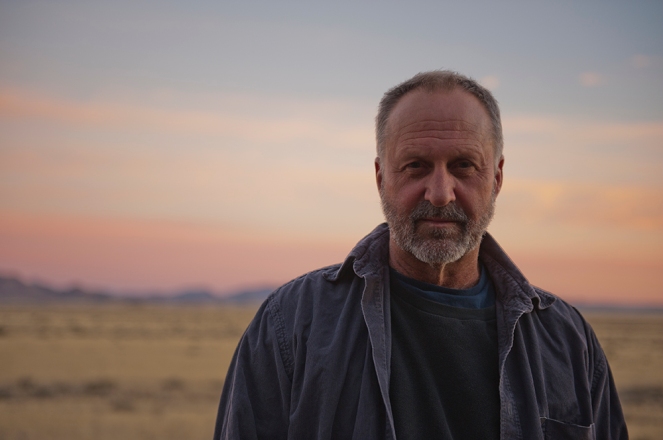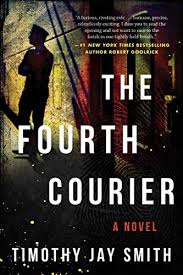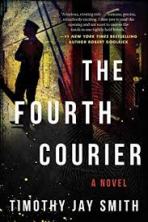
Welcome to Tea with Mrs B, an author interview series. Here to share a pot of tea and to chat about his brand new book, The Fourth Carrier, is Timothy Jay Smith.

Tim has traveled the world collecting stories and characters for his novels and screenplays which have received high praise. Fire on the Island won the Gold Medal in the 2017 Faulkner-Wisdom Competition for the Novel. He won the Paris Prize for Fiction for his first book, A Vision of Angels. Kirkus Reviews called Cooper’s Promise “literary dynamite” and selected it as one of the Best Books of 2012. Tim was nominated for the 2017 Pushcart Prize for his short fiction, “Stolen Memories.” His screenplays have won numerous international competitions. Tim is the founder of the Smith Prize for Political Theater. He lives in France.
Hello Tim. It is my pleasure to welcome you to my blog, Mrs B’s Book Reviews and thank you for joining me for Tea with Mrs B, an author interview series. To set the mood for our tea infused interview, what is your preferred beverage, tea, coffee or other? And side accompaniment, scone, cake or other?
From first thing in the morning until sunset or 5 p.m., whichever is earlier, it’s strong black coffee and rarely an accompaniment. Then I switch to wine, red in the winter and white in the summer; or sometimes, like the French drink on the hottest days, a local rosé with a cube of ice. Evening accompaniment? Tortilla chips.
Can you tell us what genres you write for and how many books you have had published?
I’m a literary thriller/smart mystery writer. I didn’t choose those defining adjectives; they are what reviewers have used. Basically what they are saying is that my books, though in action genres, aren’t all about action, but equally about characters. I take an event or threat—a thriller plot—and examine what it means through the eyes of the people it affects. In my new book, The Fourth Courier, I use a series of murders related to a nuclear smuggling operation to give the reader an insight into how, in 1992 at the very end of the Cold War, families in Poland coped with their collective hangover from communism.
I like to write what I like to read, and that’s relatively fast-paced stories but not all action, which have depth and verge on literary. So good plotting with good writing. Also, I like my novels to bring some awareness to an issue of social importance. In A Vision of Angels, I look at how four families become intertwined by a suicide bomb plot in Jerusalem. Cooper’s Promise is the story of a soldier’s redemption through a tale about human trafficking.
That’s three books published to date. I am finishing my final edits on a fourth novel, set in Greece, which will be my homage to a country I love where I have spent a cumulative six or seven years. I’m also well into a completely new work, The Syrian Pietà, set in Istanbul, in which a Syrian refugee is recruited by the CIA for an enormously dangerous mission. What all these stories have in common is a serious threat exploited story-wise from the characters’ perspectives.
The Fourth Courier, your latest novel has just been released. Can you describe the book in just a sentence?
When a Russian physicist goes missing with a portable atomic bomb, the race is on to find him before the bomb ends up in the wrong hands.
How long did it take you to write The Fourth Courier?
It’s a frequent question that’s almost impossible to answer. My rule of thumb is: screenplays take six months, novels take three years. I wrote The Fourth Courier’s first draft over ten years ago. I wanted to get the Polish experience down on paper before I forgot too much about it. I knew it wasn’t quite ready and set it aside. I always say: time is the best editor. I got distracted by new work, some screenplays, and when I finally picked it up again a couple of years ago, there was so much good stuff in it that I was ready to start my rewrites.
What character did you most identify with in The Fourth Courier?
My protagonist, Jay Porter, the FBI agent.
I can’t imagine any writer not agreeing that we constantly plumb ourselves, not always consciously, in almost every story and character we create. I can certainly recognize bits of me in all my protagonists. When I think about what a character might fear, or how s/he might torture someone, or what s/he might find annoying, of course it has to be organic to how that character has already been portrayed, but I also ask myself: what would I do? Or fear the most?
Cooper’s Promise is a good example of that. Cooper, a deserter from the war in Iraq who’s adrift in a fictitious West African country, would like to go home but can’t because he knows he’ll be thrown in jail—and he’s highly claustrophobic. So am I.
Can you tell us more about the inspiration for the time period and setting of your novel?
The Fourth Courier book goes back a long way for me. In 1989, the Berlin Wall fell and Solidarity won the first free election in Poland in over sixty years. In the same year, Mikhail Gorbachev introduced new cooperative laws in the Soviet Union, which was an area of my expertise. I was invited to the Soviet Union as a consultant, which led to my consulting throughout the former Soviet bloc, eventually living for over two years in Poland.
At the time, there was a lot of smuggling across the border between Russia and Poland, giving rise to fears that nuclear material, too, might be slipping across. While on assignment in Latvia, I met with a very unhappy decommissioned Soviet general, who completely misunderstood my purpose for being there. When an official meeting concluded, he suggested we go for a walk where we could talk without being overheard.
I followed him deep into a forest. I couldn’t imagine what he wanted. Finally we stopped, and he said, “I can get you anything you want.” I must have looked puzzled because he added, “Atomic.”
Then I understood. In an earlier conversation, there had been some passing remarks about the Soviets’ nuclear arsenal in Latvia, for which he had some responsibility, and apparently still some access. While my real purpose for being there was to design a volunteer program for business specialists, he assumed that was a front and I was really a spy. Or perhaps he thought, I really did want to buy an atomic bomb!
What ingredients do you feel are necessary to compose a successful thriller based narrative?
I remember some twenty years ago, I wrote a stage play in which there was a “reveal” by a character that a reviewer criticized for not being organic to that character. By that, she wasn’t saying it should be predictable, but it needed to come from the story and character, not suddenly drop out of nowhere. Even surprises need to be realistic. That was an important lesson for me, and something I am conscious about in everything I write.
Characters also need to be multi-dimensional. Many reviewers of The Fourth Courier have expressed surprise that I tell the story from the perspectives of both the good guys and bad guys. Bad guys are bad guys for their own reasons, which can make them more sympathetic, just like good guys shouldn’t be 100% perfect. People are complex and the characters we write need to be complex, too.
What was the most challenging and rewarding aspects of writing The Fourth Courier?
The Fourth Courier is told from several characters’ perspectives as the plot pulls them tighter and tighter together. Keeping track of who knows what when was indeed a challenge. The most rewarding aspect has been how much readers have enjoyed it, and reviewers, too. It’s very satisfying to be likened to John LeCarré, Alan Furst and Len Deighton.
What do you hope readers will take away from reading The Fourth Courier?
I wrote the book wanting to portray what life was like in Poland at the end of the Cold War, which officially ended Christmas Day 1991 when the Soviet Union was legally disbanded. For plotting purposes, The Fourth Courier takes place four months later, though Poland had freed itself from communism two years earlier. The Poles had lived for forty-five years under Soviet domination, the last of them under a harsh military regime. The country was broken and communism’s inefficiency left them destitute. In the two years that I lived there, I developed a tremendous respect for the Polish people and their struggle for liberty. I hope my readers close the book with a better understanding of what that meant.
How did you celebrate the official release day of The Fourth Courier?
Champagne with my partner.
Can you tell us about your journey to publication?
It was a long slog until the last stretch, and then it literally happened overnight. My first two books, A Vision of Angels and Cooper’s Promise, won or placed in several competitions, received excellent reviews by peers, and yet I couldn’t get anyone interested in publishing them. A Vision of Angels took on the Middle East conflict from a far too balanced point of view and Cooper’s Promise was perhaps too gay to market it mainstream.
Finally, I decided to self-publish one of them to try to get noticed. The problem with self-publishing is that everybody basically thinks you’re not good enough to get published so you self-publish. There are no gatekeepers, so to speak, and for the most part no quality control. I opted to self-publish Cooper’s Promise precisely because it had a strong gay protagonist, and I knew that the gay media would ‘forgive’ me for being self-published if I had, in fact, written a fine novel.
It was a strategic choice that paid off. The gay press in the U.S., Australia, and India all gave me excellent reviews that got me noticed by Owl Canyon Press out of Boulder, Colorado, which proceeded to reissue Cooper’s Promise and published A Vision of Angels as well.
But that wasn’t the end of my publishing journey. When I finished The Fourth Courier, I still wanted an agent and hopefully a bigger publisher. I had developed a very short list—five in all—of agents and/or agencies with whom I really wanted to work. I also spent a lot of time crafting a query letter (which is exceedingly hard to write well). I sent the letter out by email on a Sunday afternoon, assuming any agent worth his or her salt would be working on Sundays. On Monday morning, I woke up to find a message from my absolute number one choice, Mark Gottlieb at Trident Media Group, asking to see the full manuscript. On Tuesday morning, his message was: call me when you have a moment to discuss literary representation. Trust me, I found that moment!
I definitely felt that I had sprinted over the finish line.
What writers have inspired you along the way to publication?
Graham Greene for his moving stories set in exotic locations and Ernest Hemingway for his spare style.
Can you tell us about your creative working space, where do you write and is there anything vital you need to get started?
When I’m not traveling, I’m always at my desk with my office door closed. Even if I am alone in the apartment, I close my door. Same when I’m traveling, I try to create a similar set-up: a room in which I can close myself off. I’m not a writer who can work at a café or a park bench or other public spot. Occasionally I’m forced to by circumstances, and I accomplish something, but it’s not my preference.
To get started? Coffee.
Aside from writing, do you have any interesting hobbies?
I wouldn’t call them exactly hobbies. Prior to becoming a full-time writer, I had a career that took me around the world working on projects to benefit lower income people. I’ve never lost that desire to foster social and economic justice, so I take on projects. Fifteen years ago, I founded the Smith Prize for Political Theater, a $10,000 commission and development grant to encourage emerging playwrights to take on global pressing concerns through intimate stories. When the refugee crisis was at it peak in Greece a couple of years ago, I raised enough money to buy, among other things, 16,000 caps, 8,000 rain ponchos, thousands of sweatpants and hundreds of shoes, tons of food, and two portable toilets. In a much smaller way, I am still supporting a refugee kids’ sports program in Istanbul. I am also an avid environmentalist, and in the last two years I have planted 5,750 trees in Tanzania and dug a well to provide water to two villages.
What is next on the horizon for Timothy Jay Smith? Do you have any writing projects you would like to share with us?
I already mentioned that I have a book set in Greece almost ready to pass on to my agent and publisher. (I have a two-book deal with Skyhorse Publishing which is releasing The Fourth Courier through its prestigious imprint, Arcade, which represented Samuel Beckett and discovered Yo Man, winner of the 2016 Nobel Prize for Literature.) I am well along with developing the story for a new novel set in Istanbul.
What 2019 book releases are you most excited to read?
My TBR pile of books set in Istanbul—fiction and non-fiction—is so high, I can’t see over it to even know what 2019 book releases would interest me the most. The two non-Istanbul books that I will definitely read this year are The Reluctant Fundamentalist by Moshin Hamid and A Gentleman in Moscow by Amor Towles.
Finally, wrapping up our tea themed interview, who would you most like to share a pot of tea with?
I’m not being facetious when I say The Queen of England. Ever since you asked the question, I’ve mulled it over, and I keep coming back to Her Majesty Elizabeth II. Who could be more appropriate? Many years ago, I stayed at Treetops in Kenya, where Elizabeth climbed up the steps a princess and came down the next morning the Queen. I’ve always loved that story.
Thank you for taking the time to visit Mrs B’s Book Reviews for Tea with Mrs B Tim. Congratulations on the publication of The Fourth Courier!
For International Espionage Fans of Alan Furst and Daniel Silva, a new thriller set in  post-Soviet era Poland.
post-Soviet era Poland.
It is 1992 in Warsaw, Poland, and the communist era has just ended. A series of grisly murders suddenly becomes an international case when it’s feared that the victims may have been couriers smuggling nuclear material out of the defunct Soviet Union. The FBI sends an agent to help with the investigation. When he learns that a Russian physicist who designed a portable atomic bomb has disappeared, the race is on to find him—and the bomb—before it ends up in the wrong hands.
Smith’s depiction of post-cold war Poland is gloomily atmospheric and murky in a world where nothing is quite as it seems. Suspenseful, thrilling, and smart, The Fourth Courier brings together a straight white FBI agent and gay black CIA officer as they team up to uncover a gruesome plot involving murder, radioactive contraband, narcissistic government leaders, and unconscionable greed.
The Fourth Courier was published on 3rd April 2019 by Simon & Schuster. Details on how to purchase the book can be found here.
 Connect with Tim here:
Connect with Tim here:
Website
Linked in


